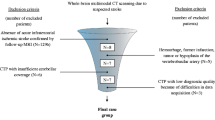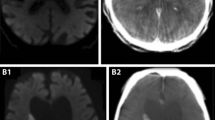Abstract
Introduction
The purposes of the present study were to compare the flow defect volumes on perfusion-weighted magnetic resonance imaging (PWI) and 99mTc-labeled ethylcysteinate dimer (99mTc-ECD) single photon emission computed tomography (SPECT) at acute and subacute stages of ischemic stroke and to analyze the relationship between the detected flow defects on the two methods and neurological status and clinical outcomes.
Methods
Perfusion defects on PWI and SPECT were measured within 48 h and on day 8 of the onset of stroke from 22 patients with their first-ever acute supratentorial ischemic stroke. The primary neurological status was evaluated prior to the imaging. Clinical outcome was assessed at 3 months after the onset of the stroke.
Results
The volumes of cerebral blood flow (CBF) defects did not differ between SPECT and PWI within the 48-h examinations. However, the volume of CBF defect was significantly larger on SPECT than on PWI on day 8 (p = 0.03). Within the 48-h examinations, the CBF defect volumes on SPECT and PWI were comparably related to the neurological status. On day 8, the CBF defect volume on SPECT showed higher correlation to the neurological status and more precisely predicted the clinical outcomes at 3 months than PWI.
Conclusions
99mTC-ECD-SPECT and PWI both have ability to detect cerebral hypoperfusion in patients with ischemic stroke but with some differences. The value of SPECT is more accurate in terms of the delayed outcome, such as prognosis and rehabilitation planning.


Similar content being viewed by others

References
Sorensen AG, Buonanno FS, Gonzalez RG, Schwamm LH, Lev MH, Huang-Hellinger FR, Reese TG, Weisskoff RM, Davis TL, Suwanwela N, Can U, Moreira JA, Copen WA, Look RB, Finklestein SP, Rosen BR, Koroshetz WJ (1996) Hyperacute stroke: evaluation with combined multisection diffusion-weighted and hemodynamically weighted echo-planar MR imaging. Radiology 199:391–401
Baird AE, Benfield A, Schlaug G, Siewert B, Lövblad KO, Edelman RR, Warach S (1997) Enlargement of human cerebral ischemic lesion volumes measured by diffusion-weighted magnetic resonance imaging. Ann Neurol 41:581–589
Karonen JO, Liu Y, Vanninen RL, Østergaard L, Partanen KPL, Vainio PA, Vanninen EJ, Nuutinen J, Roivainen R, Soimakallio S, Kuikka JT, Aronen HJ (2000) Combined perfusion- and diffusion-weighted MR imaging in acute ischemic stroke during the 1st week: a longitudinal study. Radiology 217:886–894
Karonen JO, Nuutinen J, Kuikka JT, Vanninen EJ, Vanninen RL, Partanen KPL, Vainio PA, Roivainen R, Sivenius J, Aronen HJ (2000) Combined SPECT and diffusion-weighted MRI as a predictor of infarct growth in acute ischemic stroke. J Nucl Med 41:788–794
Schramm P, Schellinger PD, Klotz E, Kallenberg K, Fiebach JB, Kulkens S, Heiland S, Knauth M, Sartor K (2004) Comparison of perfusion computed tomography and computed tomography angiography source images with perfusion-weighted imaging and diffusion-weighted imaging in patients with acute stroke of less than 6 hours’ duration. Stroke 35:1652–1658
Mayer TE, Hamann GF, Baranczyk J, Rosengarten B, Klotz E, Wiesmann M, Missler U, Schulte-Altedorneburg G, Brueckmann HJ (2000) Dynamic CT perfusion imaging of acute stroke. AJNR Am J Neuroradiol 21:1441–1449
Villringer A, Rosen BR, Belliveau JW, Ackerman JL, Lauffer RB, Buxton RB, Chao YS, Wedeen VJ, Brady TJ (1988) Dynamic imaging with lanthanide chelates in normal brain: contrast due to magnetic susceptibility effects. Magn Reson Med 6:164–174
Walovitch RC, Hill TC, Garrity ST, Cheesman EH, Burgess BA, O’Leary DH, Watson AD, Ganey MV, Morgan RA, Williams SJ (1989) Characterization of technetium-99m-L,L-ECD for brain perfusion imaging, Part 1: pharmacology of technetium-99m ECD in nonhuman primates. J Nucl Med 30:1892–1901
Lassen NA, Sperling B (1994) 99mTc-bicisate reliably images CBF in chronic brain diseases but fails to show reflow hyperemia in subacute stroke: report of a multicenter trial of 105 cases comparing 133Xe and 99mTc-bicisate (ECD, neurolite) measured by SPECT on same day. J Cereb Blood Flow Metab 14(Suppl 1):S44–S48
Karonen JO, Vanninen RL, Liu Y, Østergaard L, Kuikka JT, Nuutinen J, Vanninen EJ, Partanen KPL, Vainio PA, Korhonen K, Perkio J, Roivainen R, Sivenius J, Aronen HJ (1999) Combined diffusion and perfusion MRI with correlation to single-photon emission CT in acute ischemic stroke: ischemic penumbra predicts infarct growth. Stroke 30:1583–1590
Østergaard L, Sorensen AG, Kwong KK, Weisskoff RM, Gyldensted C, Rosen BR (1996) High resolution measurement of cerebral blood flow using intravascular tracer bolus passages. Part II: experimental comparison and preliminary results. Magn Reson Med 36:726–736
Østergaard L, Weisskoff RM, Chesler DA, Gyldensted C, Rosen BR (1996) High resolution measurement of cerebral blood flow using intravascular tracer bolus passages. Part I: mathematical approach and statistical analysis. Magn Reson Med 36:715–725
Barber PA, Davis SM, Darby DG, Desmond PM, Gerraty RP, Yang Q, Jolley D, Donnan GA, Tress BM (1999) Absent middle cerebral artery flow predicts the presence and evolution of the ischemic penumbra. Neurology 52:1125–1132
Brott T, Adams HP Jr, Olinger CP, Marler JR, Barsan WG, Biller J, Spilker J, Holleran R, Eberle R, Hertzberg V (1989) Measurements of acute cerebral infarction: a clinical examination scale. Stroke 20:864–870
Scandinavian Stroke Study Group (1985) Multicenter trial of hemodilution in ischemic stroke—background and study protocol. Stroke 16:885–890
Mahoney FI, Barthel DW (1965) Functional evaluation: the Barthel index. Md State Med J 14:61–65
van Swieten JC, Koudstaal PJ, Visser MC, Schouten HJ, van Gijn J (1988) Interobserver agreement for the assessment of handicap in stroke patients. Stroke 19:604–607
Kim HS, Kim DI, Lee JD, Jeong EK, Chung TS, Yoon PH, Lee SK, Kim EJ, Yoon YK, Suh BC, Lee BI (2002) Significance of 99mTc-ECD SPECT in acute and subacute ischemic stroke: comparison with MR images including diffusion and perfusion weighted images. Yonsei Med J 43:211–222
Rogowitz BE, Treinish LA (2006) Why should engineers and scientists be worried about color? In. http://www.research.ibm.com/people/l/lloydt/color/color.HTM
Davis SM, Chua MG, Lichtenstein M, Rossiter SC, Binns D, Hopper JL (1993) Cerebral hypoperfusion in stroke prognosis and brain recovery. Stroke 24:1691–1696
Iglesias S, Marchal G, Viader F, Baron JC (2000) Delayed intrahemispheric remote hypometabolism. Correlations with early recovery after stroke. Cerebrovasc Dis 10:391–402
Meyer JS, Obara K, Muramatsu K (1993) Diaschisis. Neurol Res 15:362–366
Feeney DM, Baron JC (1986) Diaschisis. Stroke 17:817–830
Halsey RM (1951) On the number of absolutely identifiable spectral hues. J Opt Soc Am 41:1057–1058
Karonen JO, Partanen KPL, Vanninen RL, Vainio PA, Aronen HJ (2001) Evolution of MR contrast enhancement patterns during the first week after acute ischemic stroke. AJNR Am J Neuroradiol 22:103–111
Olsen TS, Larsen B, Herning M, Skriver EB, Lassen NA (1983) Blood flow and vascular reactivity in collaterally perfused brain tissue. Evidence of an ischemic penumbra in patients with acute stroke. Stroke 14:332–341
Hida W, Kikuchi Y, Okabe S, Miki H, Kurosawa H, Shirato K (1996) CO2 response for the brain stem artery blood flow velocity in man. Respir Physiol 104:71–75
Conflict of interest statement
We declare that we have no conflict of interest.
Author information
Authors and Affiliations
Corresponding author
Additional information
J. Nuutinen and Y. Liu contributed equally to this work.
Rights and permissions
About this article
Cite this article
Nuutinen, J., Liu, Y., Laakso, M.P. et al. Perfusion differences on SPECT and PWI in patients with acute ischemic stroke. Neuroradiology 51, 687–695 (2009). https://doi.org/10.1007/s00234-009-0569-9
Received:
Accepted:
Published:
Issue Date:
DOI: https://doi.org/10.1007/s00234-009-0569-9



